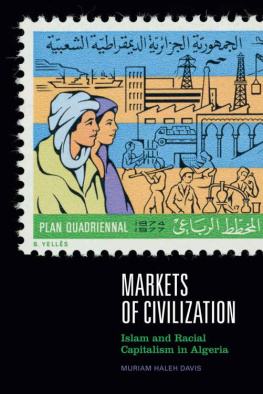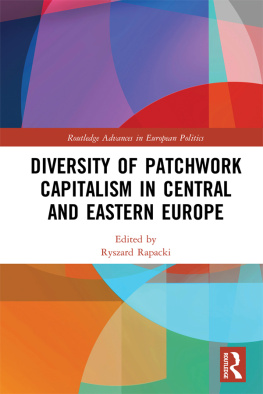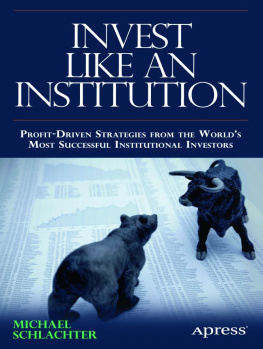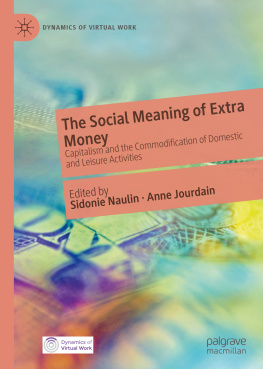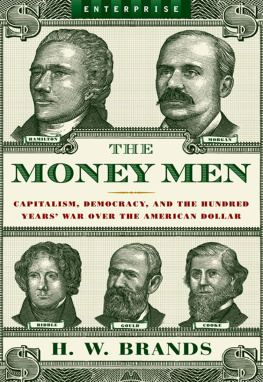Davis - Money as a social institution : the institutional development of capitalism
Here you can read online Davis - Money as a social institution : the institutional development of capitalism full text of the book (entire story) in english for free. Download pdf and epub, get meaning, cover and reviews about this ebook. year: 2017, publisher: Routledge, genre: Romance novel. Description of the work, (preface) as well as reviews are available. Best literature library LitArk.com created for fans of good reading and offers a wide selection of genres:
Romance novel
Science fiction
Adventure
Detective
Science
History
Home and family
Prose
Art
Politics
Computer
Non-fiction
Religion
Business
Children
Humor
Choose a favorite category and find really read worthwhile books. Enjoy immersion in the world of imagination, feel the emotions of the characters or learn something new for yourself, make an fascinating discovery.

- Book:Money as a social institution : the institutional development of capitalism
- Author:
- Publisher:Routledge
- Genre:
- Year:2017
- Rating:4 / 5
- Favourites:Add to favourites
- Your mark:
- 80
- 1
- 2
- 3
- 4
- 5
Money as a social institution : the institutional development of capitalism: summary, description and annotation
We offer to read an annotation, description, summary or preface (depends on what the author of the book "Money as a social institution : the institutional development of capitalism" wrote himself). If you haven't found the necessary information about the book — write in the comments, we will try to find it.
Davis: author's other books
Who wrote Money as a social institution : the institutional development of capitalism? Find out the surname, the name of the author of the book and a list of all author's works by series.
Money as a social institution : the institutional development of capitalism — read online for free the complete book (whole text) full work
Below is the text of the book, divided by pages. System saving the place of the last page read, allows you to conveniently read the book "Money as a social institution : the institutional development of capitalism" online for free, without having to search again every time where you left off. Put a bookmark, and you can go to the page where you finished reading at any time.
Font size:
Interval:
Bookmark:
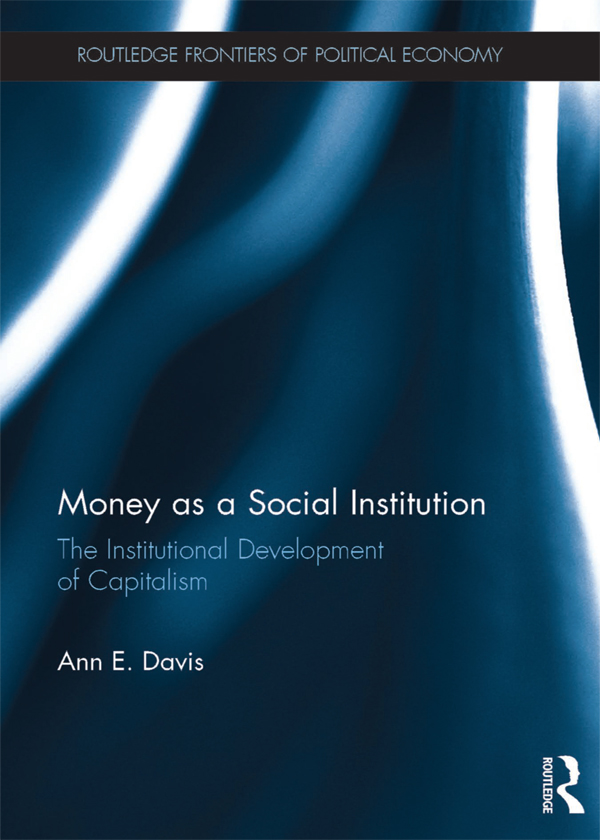
Money as a Social Institution
Money is usually understood as a valuable object, the value of which is attributed to it by its users and which other users recognize. It serves to link disparate institutions, providing a disguised whole and prime tool for the invisible hand of the market.
This book offers an interpretation of money as a social institution. Money provides the link between the household and the firm, the worker and his product, making that very division seem natural and money as imminently practical. Money as a Social Institution begins in the medieval period and traces the evolution of money alongside consequent implications for the changing models of the corporation and the state. This is then followed with double-entry accounting as a tool of long-distance merchants and bankers, then the monitoring of the process of production by professional corporate managers. Davis provides a framework of analysis for examining money historically, beyond the operation of those particular institutions, which includes the possibility of conceptualizing and organizing the world differently.
This volume is of great importance to academics and students who are interested in economic history and history of economic thought, as well as international political economics and critique of political economy.
Ann E. Davis is Associate Professor of Economics at Marist College, USA. She serves as the Chair of the Department of Economics, Accounting, and Finance, and was the founding director of the Marist College Bureau of Economic Research, 19902005. She was the Director of the National Endowment for Humanities Summer Institute on the Meanings of Property, June 2014, and is the author of The Evolution of the Property Relation, 2015.
For a full list of titles in this series please visit www.routledge.com/books/series/SE0345
223 New Financial Ethics
A Normative Approach
Aloy Soppe
224 The Political Economy of Trade Finance
Export Credit Agencies, the Paris Club and the IMF
Pamela Blackmon
225 The Global Free Trade Error
The Infeasibility of Ricardos Comparative Advantage Theory
Rom Baiman
226 Inequality in Financial Capitalism
Pasquale Tridico
227 The Political Economy of Emerging Markets
Edited by Richard Westra
228 The Social Construction of Rationality
Policy Debates and the Power of Good Reasons
Onno Bouwmeester
229 Varieties of Alternative Economic Systems
Practical Utopias for an Age of Global Crisis and Austerity
Edited by Richard Westra, Robert Albritton and Seongjin Jeong
230 Money as a Social Institution
The Institutional Development of Capitalism
Ann E. Davis
Money as a Social Institution
The Institutional Development of Capitalism
Ann E. Davis

First edition published 2017
by Routledge
2 Park Square, Milton Park, Abingdon, Oxon, OX14 4RN
and by Routledge
711 Third Avenue, New York, NY 10017
Routledge is an imprint of the Taylor & Francis Group, an informa business
2017 Ann E. Davis
The right of Ann E. Davis to be identified as author of this work has been asserted by her in accordance with sections 77 and 78 of the Copyright, Designs and Patents Act 1988.
All rights reserved. No part of this book may be reprinted or reproduced or utilised in any form or by any electronic, mechanical, or other means, now known or hereafter invented, including photocopying and recording, or in any information storage or retrieval system, without permission in writing from the publishers.
Trademark notice: Product or corporate names may be trademarks or registered trademarks, and are used only for identification and explanation without intent to infringe.
British Library Cataloguing-in-Publication Data
A catalogue record for this book is available from the British Library
Library of Congress Cataloging-in-Publication Data
Names: Davis, Ann E., 1947- author.
Title: Money as a social institution : the institutional development of capitalism / Ann E. Davis.
Description: Abingdon, Oxon ; New York, NY : Routledge, 2017. | Includes index.
Identifiers: LCCN 2017000587| ISBN 9781138945869 (hardback) | ISBN 9781315671154 (ebook)
Subjects: LCSH: MoneySocial aspects. | Social institutions. | Capitalism.
Classification: LCC HG220.A2 D39 2017 | DDC 332.4dc23
LC record available at https://lccn.loc.gov/2017000587
ISBN: 978-1-138-94586-9 (hbk)
ISBN: 978-1-315-67115-4 (ebk)
Typeset in Times New Roman
by DiacriTech
Money is usually understood as a valuable object. On the contrary, the contention defended here is that money is a symbol utilized by a sovereign nation to enforce discipline for the achievement of national priorities. The value of money is attributed to it by its users, which other users recognize.
In other words, this book offers an interpretation of money as a social institution. The method is historical institutionalism, which makes use of linguistic statements, related institutions, and the associated expertise. This institutional complex evolves historically, with changing meanings over time.
This particular application to the concept of money makes use of recent contributions to the linguistic turn by such philosophers as John Searle. That is, money is a form of symbolic communication, with explicit documentation and implicit meanings. Second, money relates to the discipline of modern institutions, an analysis drawing upon Foucaults critique of modernity and Marxs critique of political economy. Third, money relates to the history of the state, drawing upon historians of the fiscal/military state such as Brewer, Tilly, and Schumpeter. Legitimacy and expertise also relate to the strength of the state, drawing upon the work of Habermas and Poovey. Finally, the persistence of core institutions like the corporation draws upon the analysis of John Padgett and John Powell, as well as Brian Arthur and Harold Berman.
The begins with a discussion of these three distinctive characteristics of money: its symbolic nature, disciplinary aspects, and relation to sovereignty. The key theorists of moneyMarx, Keynes, and Simmelare discussed and their major insights compared. The role of the individual is explored in the context of such a complex social institution, which improbably seems to empower solitary agents.
The considers the social theorists John Searle and Michel Foucault and provides a dialogue between them regarding the contradictory aspects of money. This dialogue helps to further develop the method of historical institutionalism in relation to money, drawing insights from both.
The public/private divide, are examined to better understand how the role of labor is rendered relatively invisible.
The provides a long-term history of money in the context of related institutional changes. This chapter begins with coin, the prototype of money, but emphasizes the social and institutional nature of the use and interpretation of coin. The widening use of money in long-distance trade provides a context for examining the development of the monetary genres and the changing structure of the corporation as a vehicle for various types of monetary exchanges.
Font size:
Interval:
Bookmark:
Similar books «Money as a social institution : the institutional development of capitalism»
Look at similar books to Money as a social institution : the institutional development of capitalism. We have selected literature similar in name and meaning in the hope of providing readers with more options to find new, interesting, not yet read works.
Discussion, reviews of the book Money as a social institution : the institutional development of capitalism and just readers' own opinions. Leave your comments, write what you think about the work, its meaning or the main characters. Specify what exactly you liked and what you didn't like, and why you think so.







